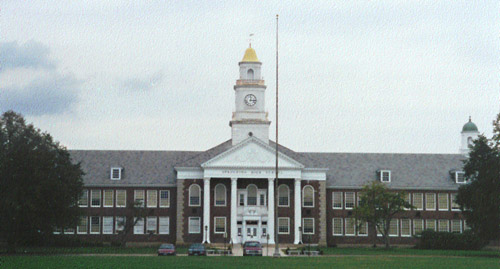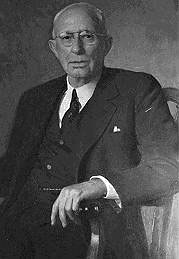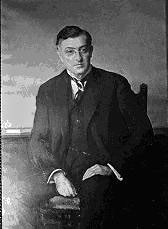
![]()
Rochester, New Hampshire


![]()

By 1936 Rochester High School (built in 1901 and located on Wakefield Street) was on the verge of overcrowding and a new school was needed in the near future. The Spaulding family donated $360,000 for a new high school. The only stipulations the Spaulding family made was that they would approve the building site and the members of the building committee. The high school was finished in 1939 and dedicated on Thursday, September 14, 1939.
The Spaulding family at that time consisted of Mr. and Mrs. Huntley Spaulding, Mr. and Mrs. Rolland Spaulding, Mrs. Dorothy Spaulding, and Mrs. Marion Potter.
[Source: Rochester Historical Society]
 Huntley N. Spaulding (left). Huntley Nowel Spaulding (October 29, 1869–November 14, 1955) was an American manufacturer and Republican politician from Rochester, New Hampshire. He was educated at Lawrence Academy at Groton, in Groton, Massachusetts, class of 1885, and later Phillips Exeter Academy, class of 1889. In 1927 he followed in the footsteps of his younger brother Roland, as the Governor of New Hampshire. Spaulding was known for his philanthropy in the fields of health and education. He served as president of the boards of trustees of Lawrence Academy and Tufts University. In 1944, the University of New Hampshire awarded Spaulding the Charles Holmes Pettee Memorial medal for distinguished service to his state and nation. [Source: New Hampshire Division of Historial Resources]
Huntley N. Spaulding (left). Huntley Nowel Spaulding (October 29, 1869–November 14, 1955) was an American manufacturer and Republican politician from Rochester, New Hampshire. He was educated at Lawrence Academy at Groton, in Groton, Massachusetts, class of 1885, and later Phillips Exeter Academy, class of 1889. In 1927 he followed in the footsteps of his younger brother Roland, as the Governor of New Hampshire. Spaulding was known for his philanthropy in the fields of health and education. He served as president of the boards of trustees of Lawrence Academy and Tufts University. In 1944, the University of New Hampshire awarded Spaulding the Charles Holmes Pettee Memorial medal for distinguished service to his state and nation. [Source: New Hampshire Division of Historial Resources]
 Rolland Spaulding. Born Townsend Harbor (MA); Rochester (NH) manufacturer. In state politics from 1905.
Rolland Spaulding. Born Townsend Harbor (MA); Rochester (NH) manufacturer. In state politics from 1905.
The brother of future New Hampshire governor Huntley Spaulding (1927/9), Rolland Spaulding (1873-1942) graduated from Phillips Academy (Andover, MA) in 1893 and went into the family fiberboard manufacturing business. In 1905 he attracted political notice as an early proponent in the New Hampshire business community of "progressive Republicanism". Spaulding joined such other New Hampshire followers of Theodore Roosevelt's reforms as the popular author Winston Churchill, an unsuccessful candidate for the 1906 Republican gubernatorial nomination, and the Cheshire County Republicans' favorite for a U.S. Senate seat, George B. Leighton. (Leighton was denied his hopes as well.)
By 1912 the "progressives" had won in New Hampshire's Republican Party, with Teddy Roosevelt's calls for reform finding substantial voter support. Spaulding was a delegate to the 1912 Republican National Convention, and in 1914 he was nominated for governor by the New Hampshire Republican Party. Although he treated the campaign as a lark, Spaulding won easily over Democrat millowner A. W. Noone. Governor Spaulding pushed for a uniform accounting system for all state agencies and he worked to improve the management of state institutions with the hope that state taxes could be reduced. He worked to streamline municipalities' accounting systems and he supported development of a long-range plan for the improvement of state highways. This led to reforms of the State Highway department.
Spaulding declined a second term and returned to his expanding family business. In 1917 he served as vice-president of the New Hampshire Defense League, but otherwise concerned himself with a number of business interests. [Source: New Hampshire Division of Historial Resources]
Red Raiders | Spaulding High School | Rochester | New Hampshire | Abenaki People | Pennacook People